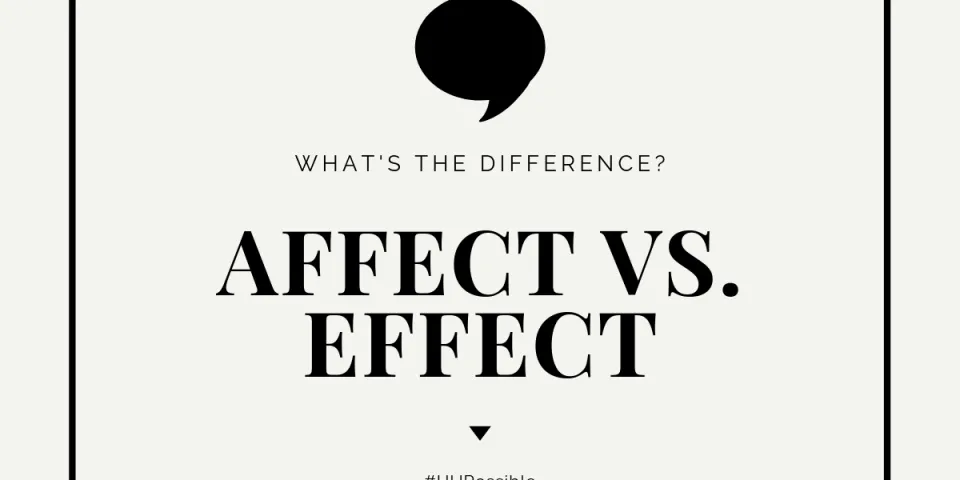Latest
Grammar Refresh: Affect vs. Effect
Jun 26, 2019

Some words sound the same but have completely different meanings depending on how they are spelled and used in a sentence. Words like to, too and two, or there, their and they’re, can confuse many writers.
For this lesson in grammar, let’s focus on the difference between affect and effect. The word “affect” is most often used as a verb, while “effect” is most often used as a noun.
- A noun identifies people, places or things (common noun), or names a particular person, place or thing (proper noun).
- A verb is used to describe an action, state or occurrence.
Now, let’s define “affect” and “effect”
- Affect is most often used as a verb, meaning to have an influence on something or someone
- Effect is most often used as a noun, meaning the result or outcome of an action
For example: If an event affects your life, you will feel the event’s effect.
When to use “affect”
Affect means to produce a change in someone or something.
- The fire affected the quality in the air.
- The positive reinforcement affected her mood.
- Will this failure affect my confidence?
- His grades were negatively affected by skipping class.
When to use “effect”
Use effect if you are describing the result of a change, or the outcome an action or event.
- The tornado had a terrible effect on the town’s infrastructure.
- She dyed her hair and the effect was that it became coarse.
- The effect of the regulation was safer work environments.
- The effect of studying more was better grades for Shelly.
- Technology has had a profound effect on our society.
Hint: The RAVEN is always right!
If you are debating on which word to use, consider the context of the sentence. Am I using a verb or a noun here? Is a person actively doing something, or is this about the result of the situation?
A helpful hint comes from vocabulary.com. They suggest thinking of Edgar Allen Poe and his RAVEN:
- Remember
- Affect
- Verb
- Effect
- Noun
Remember: Affect = Verb. Effect = Noun
If you ever get stuck on effect vs. affect, think of the Raven!
Here’s another trick: Affect and action both begin with the letter “a.” When you think “affect,” think “A for action.”
But beware of these exceptions…
In certain cases, effect can be used as a verb that means “to bring about” or "to cause." It usually shows up next to nouns like “change” or “solution.”
- The students wanted to effect change in their community by running a food drive.
Affect can also be used as a noun to identify a feeling, mood or emotional state or response. It's rare for affect to be used this way in everyday language.
- The parents noticed that their daughter had a certain affect when she asked them for a favor.
Why does this matter?
Using the wrong format of a word can change the meaning of your sentence entirely. Proper grammar and spelling is essential if you want to improve your writing skills, which are vital for your academic and career success.
For more writing help, visit our Writing Center online. Our writing coaches can help you revise your essays for clarity and flow and show you proofreading strategies to catch common grammar and spelling errors like these.
Find Your Program At Herzing University
Bureau of Labor Statistics (BLS), U.S. Department of Labor, Occupational Employment and Wage Statistics 2023 / Occupational Outlook Handbook 2022. BLS estimates do not represent entry-level wages and/or salaries. Multiple factors, including prior experience, age, geography market in which you want to work and degree field, will affect career outcomes and earnings. Herzing neither represents that its graduates will earn the average salaries calculated by BLS for a particular job nor guarantees that graduation from its program will result in a job, promotion, salary increase or other career growth.
Latest
Recent Blog Posts
Subscribe to our Newsletter
Get the latest news you need to know, from study hacks to interview tips to career advancement. Have it delivered right to your inbox biweekly.








